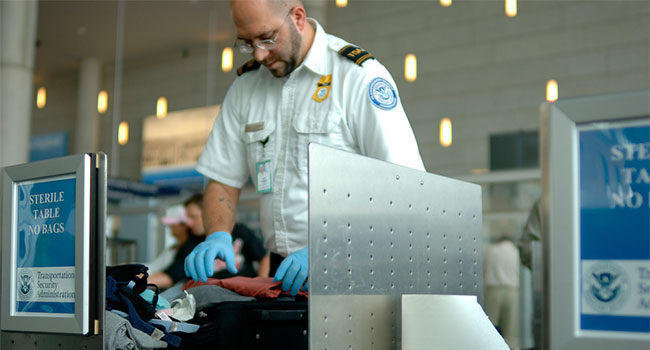
TSA Agents, CDC Screeners Demand More Effective Masks to Protect Against Coronavirus
After airport security screeners called for the government to provide N95 respirators instead of surgical masks, the CDC has begun to make them “optional” for those employees.
- By Haley Samsel
- Mar 11, 2020
Agents for the Transportation Security Administration are concerned about protecting themselves from contracting COVID-19, leading union representatives to push for more effective masks for airport security screeners.
The AFGE TSA Council 100, which represents about 45,000 TSA officers, sent an email on Tuesday to TSA Administrator David Pekoske to supply N95 respirator masks to the agency’s employees, Reuters reported.
Those concerns were escalated by reports last week that at least two Centers for Disease Control and Prevention (CDC) at Los Angeles International Airport tested positive for the coronavirus.
As of now, agents have the option to wear surgical masks, but those masks are not produced to block small particles that could transmit the coronavirus, according to Reuters. The N95 respirators, union president Hydrick Thomas said, can protect wearers from smaller pathogens that spread COVID-19.
“Everything we do is for the safety of the passengers, but at the same time you have to safeguard yourself,” Thomas told Reuters.
One CDC official told Reuters that surgical masks, which were previously recommended to TSA officers, “won’t protect” screeners from getting the virus.
“They just protect us from infecting someone else,” the CDC medical official, who was involved in airport screening, said. “We want to know why we can’t wear N-95 masks. It’s crazy … You might as well have a tissue over your face for all the good it will do.”
In response to the report, the CDC released new guidelines to make the N95 masks optional for those screeners. There are two types of N95 respirators, according to Occupational Health & Safety magazine: surgical and industrial.
Surgical N95 respirators are designed for healthcare workers and fit tightly around the nose and mouth. If worn correctly, they can block at least 95 percent of small airborne particles. However, healthcare professionals are legally required to undergo annual fit tests for these masks, and they are not recommended for the general population.
Industrial respirators are designed to reduce the wearer’s exposure against certain airborne particles and aerosols that do not have oil. Most CDC screeners have been using the surgical respirators.
The federal government is addressing a global shortage, caused by the rapid purchase of the respirators by non-healthcare professionals, by working with manufacturers to produce 500 million respirators in the next six to 12 months. About 13 million are on hand as of last week, according to Reuters.
About the Author
Haley Samsel is an Associate Content Editor for the Infrastructure Solutions Group at 1105 Media.